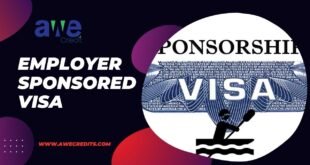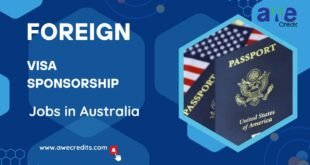Finding a job in Canada as a foreigner can be challenging. But visa sponsorship can make the process easier.
Canada offers many opportunities for skilled workers from around the world. With a diverse economy and welcoming culture, the country is an attractive destination for job seekers. Employers in Canada often sponsor visas, allowing foreigners to work and live there legally.
This sponsorship can open doors to various industries, from technology and healthcare to hospitality and construction. Understanding how to secure such jobs can be key to starting a new life in Canada. In this guide, we’ll explore the best ways to find jobs with visa sponsorship in Canada. Whether you’re dreaming of a fresh start or seeking better career prospects, this information could be your ticket to success.
You May Also Like:

VISA Sponsorship Basics
Canada is a popular destination for foreigners looking for job opportunities. The country offers various visa sponsorship programs to attract skilled workers from around the world. Understanding the basics of visa sponsorship is essential for anyone seeking to work in Canada. This guide provides an overview of the types of visas available and the eligibility criteria for foreign workers.
Types of Visas
Canada offers several types of visas for foreign workers. Each visa type has specific requirements and benefits.
Here are the main types of visas:
- Temporary Work Permit: This visa allows foreigners to work in Canada for a limited period. It is usually employer-specific, meaning you can only work for the employer who sponsored you.
- Permanent Residence (PR) Visa: This visa is for those looking to settle in Canada permanently. It includes various programs like Express Entry, Provincial Nominee Program (PNP), and Family Sponsorship.
- Open Work Permit: This visa is not employer-specific. It allows you to work for any employer in Canada. It is often given to spouses of skilled workers or international students.
Below is a table summarizing these visa types:
| Visa Type | Description | Duration |
|---|---|---|
| Temporary Work Permit | Allows work for a specific employer | Up to 4 years |
| Permanent Residence (PR) Visa | Allows permanent settlement | Indefinite |
| Open Work Permit | Allows work for any employer | Varies |
Eligibility Criteria
Meeting the eligibility criteria is crucial for obtaining a visa. Each visa type has different requirements.
General eligibility criteria include:
- Job Offer: You must have a valid job offer from a Canadian employer.
- Language Proficiency: Proficiency in English or French is required. You may need to take a language test.
- Education and Skills: Relevant education and skills are essential. Some visas require specific qualifications.
- Health and Character: You must pass a medical exam and provide a police clearance certificate.
For a Temporary Work Permit, the employer must obtain a Labour Market Impact Assessment (LMIA). This assessment proves that hiring a foreign worker will not negatively impact the Canadian job market.
For a Permanent Residence (PR) Visa, you need to score enough points under the Express Entry system. Points are awarded based on age, education, work experience, and language skills.
For an Open Work Permit, eligibility often depends on the status of your spouse or partner. For example, if your spouse is a skilled worker or student in Canada, you may qualify.
Understanding these criteria is the first step towards finding a job in Canada with visa sponsorship.

Job Market Overview
Canada is a great place for foreigners looking for jobs with visa sponsorship. The country has a strong economy and many job opportunities. A lot of companies are willing to sponsor visas for skilled workers. This makes Canada an attractive destination for job seekers from around the world. Below is an overview of the job market and key industries with high demand.
High-demand Industries
Several industries in Canada have a high demand for skilled workers. These industries often need foreign workers to fill the gaps. Here are some of the top sectors:
- Healthcare: Nurses, doctors, and healthcare aides are always needed. The aging population increases this demand.
- Information Technology: Software developers, IT managers, and data analysts are in high demand. Tech companies are growing rapidly.
- Construction: Engineers, electricians, and construction managers are required. Many infrastructure projects are underway.
- Education: Teachers and educational administrators are needed. This is especially true in rural areas.
- Agriculture: Farm workers and agricultural technicians are in demand. Canada has a large agricultural sector.
These industries offer many opportunities for foreign workers. Companies in these sectors are often open to visa sponsorship. This helps them find the skilled workers they need. Job seekers should focus on these industries for better chances of employment.
Regional Opportunities
Different regions in Canada have varying job opportunities. Each region has its own high-demand sectors. Here is a look at some key regions and their opportunities:
| Region | High-Demand Jobs |
|---|---|
| Ontario | IT professionals, healthcare workers, and teachers |
| British Columbia | Tech workers, construction professionals, and educators |
| Alberta | Engineers, healthcare staff, and oil industry workers |
| Quebec | IT specialists, healthcare employees, and factory workers |
| Manitoba | Agricultural workers, healthcare staff, and educators |
Each region has its own unique opportunities. Job seekers should research the region that best matches their skills. This can improve their chances of finding a job with visa sponsorship. Canada’s diverse regions offer many possibilities for foreign workers.
Finding Job Opportunities
Canada is a popular destination for foreigners seeking new job opportunities. Many companies in Canada offer visa sponsorship, making it easier for skilled workers to move. Finding job opportunities in Canada can be exciting and rewarding. This guide will help you discover the best ways to find jobs in Canada with visa sponsorship.
Job Boards and Websites
Many job boards and websites list job opportunities for foreigners in Canada. These platforms can be very helpful in your job search. Some of the most popular job boards include:
- Indeed Canada: A well-known job board with many listings for various industries.
- Job Bank: The Canadian government’s job site, which includes many visa-sponsored jobs.
- Workopolis: Another popular job board with a wide range of job postings.
Many companies also post job openings on their own websites. It’s a good idea to check the career sections of companies you’re interested in. Additionally, LinkedIn can be a powerful tool for job searching. You can use LinkedIn to find jobs, connect with recruiters, and learn more about companies.
Here is a table of some useful job websites:
| Website | Description |
|---|---|
| Indeed Canada | A large job board with many listings. |
| Job Bank | The official job site of the Canadian government. |
| Workopolis | A popular job board with various job postings. |
Networking Strategies
Networking is a crucial part of finding job opportunities in Canada. Building connections can help you learn about job openings and get referrals. Some effective networking strategies include:
- Attend Job Fairs: Many cities in Canada host job fairs. These events allow you to meet employers and learn about job opportunities.
- Join Professional Associations: Professional groups and associations often have job boards and networking events. Joining these groups can help you meet people in your industry.
- Use Social Media: Platforms like LinkedIn and Twitter can be useful for networking. Connect with professionals in your field and engage with their content.
Informational interviews can also be very helpful. Reach out to people working in your desired field and ask for a meeting. This can give you insights into the industry and help you build connections. Volunteering is another way to network. It allows you to gain experience and meet new people.
Here are some tips for effective networking:
- Be polite and respectful.
- Follow up after meeting someone new.
- Offer help to others when you can.
Building a strong network takes time and effort. But it can greatly increase your chances of finding a job in Canada.
Application Process
Canada is a popular destination for foreigners seeking job opportunities with visa sponsorship. The application process might seem complex, but with the right guidance, it becomes manageable. This article will help you understand how to create a strong resume and cover letter for job applications in Canada. These tips will improve your chances of success.
Resume Tips
Creating an effective resume is key to landing a job in Canada. Here are some important tips to consider:
- Contact Information: Include your name, phone number, and email address at the top.
- Professional Summary: Write a brief summary of your skills and experience.
- Work Experience: List your most recent jobs first. Include job title, company name, and dates of employment.
- Education: Mention your highest degree first. Include the name of the institution and graduation date.
- Skills: Highlight skills relevant to the job you are applying for.
Make sure your resume is clear and easy to read. Use bullet points to list your responsibilities and achievements. Here is a simple table to help you format your work experience:
| Job Title | Company | Dates |
|---|---|---|
| Software Developer | ABC Tech | Jan 2020 – Present |
| IT Specialist | XYZ Solutions | Mar 2018 – Dec 2019 |
Cover Letter Essentials
A strong cover letter can make a big difference. Here are some key points to include:
- Introduction: Mention the job you are applying for and where you found the job listing.
- Why You Are a Good Fit: Highlight your skills and experience that match the job requirements.
- Company Research: Show that you know about the company and why you want to work there.
- Conclusion: Thank the employer for considering your application and mention that you are looking forward to an interview.
Keep your cover letter short and to the point. Here is a simple format to help you:
Dear [Employer’s Name],
I am writing to apply for the [Job Title] position at [Company Name]. I found the job listing on [Website/Source]. With my background in [Your Field], I believe I am a great fit for this role.
I have [Number] years of experience in [Your Field]. My skills include [Skill 1], [Skill 2], and [Skill 3]. I am particularly impressed by [Company Name]’s commitment to [Value or Project]. I am excited about the opportunity to contribute to your team.
Thank you for considering my application. I look forward to discussing my qualifications in more detail.
Sincerely,
[Your Name]
Preparing for Interviews
Canada is a land of opportunities. Many foreigners dream of working there. With visa sponsorship, this dream can become a reality. But, getting a job in Canada requires preparation. One key step is preparing for interviews. This process can be different from what you’re used to. Understanding common interview questions and cultural considerations can help you succeed.
Common Interview Questions
Interview questions in Canada can be straightforward. But, it is crucial to be ready for them. Here are some common interview questions you might encounter:
- Tell me about yourself.
- Why do you want to work here?
- What are your strengths and weaknesses?
- Describe a challenging work situation and how you handled it.
- Where do you see yourself in five years?
These questions help employers understand your background and goals. It’s important to give clear and concise answers. Practice answering these questions before your interview. You can also prepare by researching the company. Know their mission and values. This shows you are interested and motivated.
Cultural Considerations
Cultural differences can impact your interview. Understanding Canadian work culture is essential. Here are some important cultural considerations:
- Be on time. Canadians value punctuality.
- Dress professionally. First impressions matter.
- Maintain eye contact. It shows confidence and honesty.
- Speak clearly and politely. Avoid using slang.
- Respect personal space. Don’t get too close.
These small details can make a big difference. Being aware of them will help you fit in better. Also, Canadians appreciate a positive attitude. Show enthusiasm for the job and the company. It can set you apart from other candidates.
Settling in Canada
Canada is a dream destination for many looking for job opportunities. For foreigners, finding a job in Canada with visa sponsorship is a big step. Settling in Canada can be a smooth process if you know the right steps. This guide will help you understand housing options and community resources available for newcomers.
You May Also Like:

Housing Options
Finding a place to live is one of the first steps in settling in Canada. There are various housing options available:
- Renting an Apartment: Many newcomers prefer to rent an apartment. It is a flexible option and easier to manage.
- Buying a Home: For those planning to stay long-term, buying a house can be a good investment. It offers stability and a sense of belonging.
- Shared Housing: Sharing a home with others can reduce costs. It is also a way to make new friends and learn about Canadian culture.
- Temporary Housing: Short-term rentals or hotels can be good for initial stay. This allows you to explore neighborhoods before deciding where to settle.
Costs can vary greatly depending on the city. Here is a brief comparison:
| City | Average Rent (1-bedroom) | Average Home Price |
|---|---|---|
| Toronto | $1,800/month | $1,000,000 |
| Vancouver | $2,000/month | $1,200,000 |
| Montreal | $1,200/month | $500,000 |
Community Resources
Newcomers can find many community resources to help them settle. These resources offer support and guidance:
- Immigrant Services: These organizations offer free services to help with job search, language training, and more.
- Community Centers: Local centers provide social and recreational activities. They are great for meeting people and making friends.
- Libraries: Libraries are more than just books. They offer free internet, educational programs, and information about local events.
- Health Services: Health clinics and hospitals offer medical support. Newcomers should register for health insurance as soon as possible.
- Language Classes: Learning English or French is crucial. Many places offer free or low-cost language classes.
Utilizing these resources can make your transition smoother. They provide a support network and help you integrate into Canadian society.
Long-term Residency Pathways
Canada is a popular destination for foreigners seeking job opportunities and a better quality of life. One of the biggest attractions is the possibility of obtaining visa sponsorship. This allows individuals to work legally and eventually settle down in Canada. Understanding the pathways to long-term residency can be crucial for those looking to make Canada their permanent home.
Permanent Residency Options
Gaining permanent residency in Canada opens up many doors for foreign workers. It offers stability and numerous benefits. Here are some popular options:
- Express Entry System: This is a fast-track system for skilled workers. It includes three programs: Federal Skilled Worker Program, Federal Skilled Trades Program, and Canadian Experience Class.
- Provincial Nominee Program (PNP): Provinces and territories nominate individuals who wish to settle in a particular province. Each province has its own criteria and programs.
- Family Sponsorship: Canadian citizens and permanent residents can sponsor their relatives. This option is available for spouses, children, and parents.
These programs have different requirements. They also offer various benefits. For instance, the Express Entry System is points-based. It considers factors like age, education, work experience, and language skills. PNPs, on the other hand, may require a job offer from a Canadian employer. Family Sponsorship focuses on family ties and relationships.
Each pathway has its own application process. It is important to research and choose the right one. Many find the Express Entry System to be the quickest route. PNPs are ideal for those with job offers in specific provinces. Family Sponsorship is best for those with close relatives in Canada.
Citizenship Process
Once permanent residency is obtained, the next step is citizenship. Becoming a Canadian citizen has many advantages. It includes the right to vote and hold public office. It also allows for a Canadian passport. This makes travel easier.
To apply for citizenship, several requirements must be met:
- Residency Requirement: Must have lived in Canada for at least 3 out of the last 5 years.
- Language Skills: Basic proficiency in English or French is required. Applicants between ages 18 and 54 must take a language test.
- Knowledge of Canada: Understanding of Canada’s history, values, institutions, and symbols. This is tested through a citizenship test.
- Clear Criminal Record: Good character is essential. Any criminal history can affect the application.
The citizenship application process involves several steps. First, gather all necessary documents. This includes proof of residency, language test results, and identification. Next, complete the application form and pay the required fee. Submit the application to Immigration, Refugees and Citizenship Canada (IRCC).
After submitting the application, there may be a waiting period. IRCC will review the application and may ask for additional information. Once approved, the applicant must attend a citizenship ceremony. At the ceremony, the new citizen takes the Oath of Citizenship. This is a formal commitment to the responsibilities and privileges of being a Canadian citizen.
Understanding these steps can make the process smoother. Preparation is key. Ensure all requirements are met before applying. This increases the chances of a successful application.
Conclusion
Exploring job opportunities in Canada can be life-changing for foreigners. Visa sponsorship opens doors to a brighter future. Many industries seek skilled workers from abroad. Research and preparation enhance your chances. Stay patient and persistent in your job search. Canada values diverse skills and experiences.
 AWE Credits Free VISA Consultancy Service in USA, UK, UAE, CANADA, Australia
AWE Credits Free VISA Consultancy Service in USA, UK, UAE, CANADA, Australia





